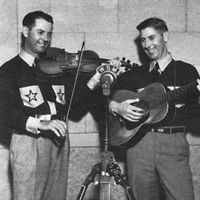Annotation:Lafayette: Difference between revisions
No edit summary |
No edit summary |
||
| (4 intermediate revisions by 2 users not shown) | |||
| Line 1: | Line 1: | ||
---------- | |||
---- | {{TuneAnnotation | ||
|f_tune_annotation_title= https://tunearch.org/wiki/Annotation:Lafayette > | |||
'''LAFAYETTE'''. | |f_annotation='''LAFAYETTE'''. American, Reel. D Major. Standard tuning (fiddle). AB. The melody was popularised on the Grand Ole Opry by fiddler Kirk McGee (1899-1983, Williamson County, Tennessee). Jon Pankake (who wrote the liner notes for Folkways FW3 1007) interviewed McGee in 1965, and was told that "Lafayette" was "an old Civil War tune," although McGee did not mention a source for his version. McGee recorded the tune playing the fiddle, backed by Fiddlin' Arthur Smith on 5-string banjo, and it was popular for many years as a dance tune on the Grand Old Opry. | ||
[[File:mcgee.jpg|200px|thumb|left|Sam & Kirk McGee]] | |||
|f_source_for_notated_version= North-west fiddler Ole Winn via Scott Marckx [Silberberg]. | |||
|f_printed_sources=Silberberg ('''Tunes I Learned at Tractor Tavern'''), 2002; p. 81. | |||
|f_recorded_sources=Folkways FW3 1007, Kirk McGee (fiddle) & Arthur Smith (banjo) - "Milk 'em in the Evening Blues" (1968). Whipporwill 1001, Jim Wood & John Hartford - "The Bullies Have all Gone to Rest" (1998. Learned by John Hartford from the playing of Opry fiddler Earl White, who had it from Kirk McGee). | |||
|f_see_also_listing= | |||
}} | |||
Latest revision as of 02:24, 10 January 2023
X:0 T: No Score C: The Traditional Tune Archive M: K: x
LAFAYETTE. American, Reel. D Major. Standard tuning (fiddle). AB. The melody was popularised on the Grand Ole Opry by fiddler Kirk McGee (1899-1983, Williamson County, Tennessee). Jon Pankake (who wrote the liner notes for Folkways FW3 1007) interviewed McGee in 1965, and was told that "Lafayette" was "an old Civil War tune," although McGee did not mention a source for his version. McGee recorded the tune playing the fiddle, backed by Fiddlin' Arthur Smith on 5-string banjo, and it was popular for many years as a dance tune on the Grand Old Opry.


